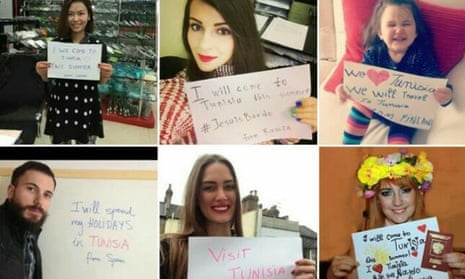People around the world are pledging to visit Tunisia this summer as a sign of solidarity following the deadly attack on the Bardo museum on Wednesday.
Thousands of the pledges have appeared on social media since the attack, attached to the hashtag #JeSuisBardo, a reference to the #JeSuisCharlie campaign that emerged in the aftermath of the shootings at the Charlie Hebdo magazine office in Paris earlier this year when 12 people were killed.
Photos from around the world, posted on Instagram and Twitter, show users holding up a handwritten sign promising: “I will come to Tunisia this summer.” Some of the selfies have received hundreds of likes as the hashtag continues to gain momentum online.
Wednesday’s terror attack, which saw 23 people killed, including 20 foreign tourists, is a major concern for Tunisa’s tourism industry, which had been showing tentative signs of recovery following years of decline. Cruise lines MSC and Costa, both of which had carried passengers who lost their lives in the attack, have already stated that all calls to Tunis in the coming months will be cancelled and replaced with alternative stops.
This article includes content provided by Instagram. We ask for your permission before anything is loaded, as they may be using cookies and other technologies. To view this content, click 'Allow and continue'.
The tourist industry in the North African country had been suffering for years following the 2011 revolution that led to the ousting of authoritarian President Zine El Abidine Ben Ali and marked the start of the Arab spring. In 2010 Tunisia welcomed close to 7 million tourists but this fell to 6 million following the revolution. Travel and tourism makes up 15.2% of the country’s GDP, supporting 472,000 jobs, and the government has been working hard since then to boost visitor numbers.
French tourists have traditionally been among Tunisia’s most prominent travellers, but this too has proved to be fragile. In January the Tunisian tourism minister complained about a spate of “irrational” cancellations following the Charlie Hebdo attacks.
The latest online solidarity campaign, which includes many social media users from France, as well as other European countries and the US, could lead to a change of heart. In 2014 Tunisia’s tourist numbers were still down by 3.2% on the previous year, but revenue was up by more than 6%, suggesting visitors were spending more during their stay. The number of German, Italian, British and Algerian visitors had also increased.
This article includes content provided by Instagram. We ask for your permission before anything is loaded, as they may be using cookies and other technologies. To view this content, click 'Allow and continue'.
And although tourist numbers are still nowhere near pre-2011 levels, there has been a growing sense of optimism in the North African country. National Geographic Travel magazine listed Tunis among the best places to visit in 2015, tragically pointing to the Bardo museum, which had just reopened following an ambitious renovation, among the key attractions.
According to Travel Association ABTA, since the creation of a stable democracy visitor numbers to Tunisia have increased rapidly, with 424,000 travelling from the UK in 2014. Bookings this year also appeared to support the positive trend. Most British tourists stay on the coast, rather than the capital.
“Early bookings for this summer have been very healthy but the attack in Tunis this week will almost certainly have a short-term impact,” a spokesperson for Abta said. But they also added that they hoped the stoic nature of British travellers wouldn’t lead to a decline in interest in travel there.
“UK holidaymakers are resilient, taking a balanced, realistic view in relation to risk,” they said. “Many appreciate that in the current global environment no country is entirely free from the risk of terrorist attack, including the UK. Tourism is a vital source of employment for the Tunisian people and it would be a tragedy if they too were to become further victims of this cowardly attack because of reduced income and job losses.”
Currently, the Foreign Office warns against visiting the area around the Bardo museum and for tourists to “follow the instructions of the Tunisian security authorities”.

Comments (…)
Sign in or create your Guardian account to join the discussion